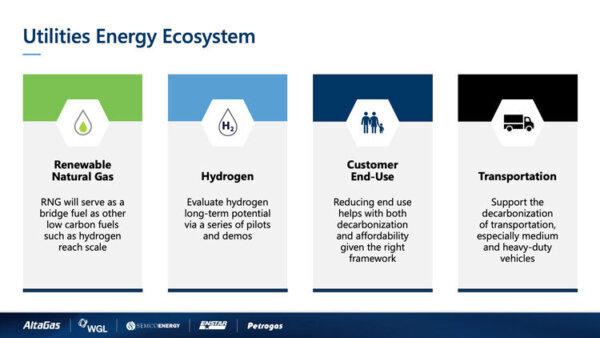This article, provided by Washington Gas, first appeared online at the Washington Business Journal.
Washington Gas is on a journey to decarbonize our business in the DMV. As the senior vice president of strategy and innovation, I’m leading our effort, which we see as a multi-legged approach. I’d like to share with you how we will focus on the supply decarbonization leg and how we are leveraging this effort to help the transportation industry reach their greenhouse gas reduction goals.
Our supply decarbonization plan hinges on using certified natural gas, renewable natural gas and hydrogen. At present, our supply is nearly 100% natural gas. We are committed to deliver at least 10% of fuel from lower carbon sources by 2030.
Let’s start with renewable natural gas (RNG), and our commitment to a project with WSSC Water last year. Washington Gas is working with WSSC Water to support their production of renewable natural gas from their Piscataway Bioenergy facility for their internal use. The interconnection and construction for this project are well underway. Based on the project plan and the current status of work, it is expected to be operational later this year, and we believe commercial operations will begin next year.
We are currently engaged in discussions with many landfill and wastewater plant operators in our operating area to make progress towards the 2030 goal using our own local supply of energy.
Next on our list is hydrogen. Hydrogen has potential because it’s a very flexible fuel that can be produced and used in many ways, including electrolysis from renewable energy such as solar and wind, or from carbon free nuclear energy. Other ways to produce hydrogen include using RNG as the feedstock or from natural gas-based production coupled with carbon capture.
We feel renewable natural gas can be a step in the right direction, but hydrogen would allow us to scale in decarbonizing our system. We see RNG as a more immediate term option (e.g., during the next five years), while hydrogen is a longer-term option in the 2030 to 2050 timeframe.
We are also excited about hydrogen because there is significant interest from investors and end-users, and the federal government is stepping in to support a hydrogen market. As a matter of fact, the infrastructure bill that passed last year has significant funding for hydrogen.
This will benefit Washington Gas customers and the entire region through potential job creation and skill building. It will also help ensure equitable outcomes regardless of location because hydrogen, when used in transportation and power production, can help decarbonize the energy system and reduce air pollution in the area.
In heavy duty transportation, such as long-haul trucks, trains and medium-duty vehicles, such as buses, garbage trucks and delivery trucks, natural gas can be used in lieu of diesel to reduce greenhouse gases and harmful emissions, such as nitrogen oxide and particulates. When RNG is used in vehicles instead of natural gas, a high degree of decarbonization is possible. In the longer term, heavy duty transportation vehicles can become hydrogen fuel cell vehicles to complement light-duty battery electric vehicles (zero emission vehicles).
What we’re currently working on
We’re looking into piloting an end-to-end hydrogen ecosystem at our Springfield Operations Center where we will potentially have an electrolyzer powered by solar, a hydrogen fuel dispensing system, two to four medium duty hydrogen fuel cell electric vehicles for our crew use and a Bloom Energy fuel cell that can accept a natural gas/hydrogen blend of up to 20% hydrogen. It’s a miniature hydrogen ecosystem that we believe will be a shining example for any stakeholders interested in the DMV.
We are also engaging broader regional stakeholders. We are proud to be a Platinum Sponsor of Connected DMV’s National Capital Hydrogen Center. Along with other key stakeholders in the region, we’re working hard to promote a hydrogen economy in the DMV.

Mallik Angalakudati is senior vice president for strategy and innovation at Washington Gas. Washington Gas is proud member of the Washington Board of Trade. For 130 years, the Board of Trade has represented all industry sectors in the District of Columbia, suburban Maryland and Northern Virginia. Pro-business and non-partisan, we use our tremendous convening power to drive smart, innovative solutions for inclusive economic growth and livability.







